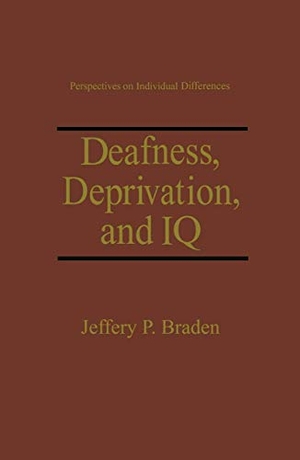Für statistische Zwecke und um bestmögliche Funktionalität zu bieten, speichert diese Website Cookies auf Ihrem Gerät. Das Speichern von Cookies kann in den Browser-Einstellungen deaktiviert werden. Wenn Sie die Website weiter nutzen, stimmen Sie der Verwendung von Cookies zu.
Cookie akzeptieren
Jeffery P. Braden
Deafness, Deprivation, and IQ
- Springer US
- 1994
- Gebunden
- 252 Seiten
- ISBN 9780306446863
Deafness is a "low incidence" disability and, therefore not studied or understood in the same way as other disabilities. Historically, research in deafness has been conducted by a small group of individuals who communicated mainly with each other. That is not to say that we did not sometimes publish in the mainstream or attempt to communicate outside our small circle. Nonetheless, most research appeared in deafness-related publications where it was not likely to be seen or valued by psychologists. Those researchers did not understand what they could leam from the study of deaf people or how their knowledge of individual differ ences and abilites applied to that
Mehr
Weniger
zzgl. Versand
in Kürze